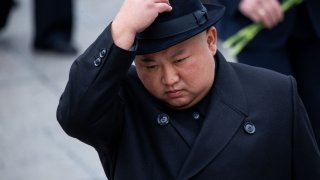China is aware that Russia cannot fully assume its role in the DPRK.

The Russia-Democratic People’s Republic of Korea (DPRK) Treaty on Comprehensive Strategic Partnership, signed between Russia and the DPRK in June of this year, is regarded as a resurrection of the 1961 Treaty of Friendship, Cooperation, and Mutual Assistance between the USSR and the DPRK, which provided for automatic military intervention in times of war.
The 1961 treaty was abrogated in 1996 when Russia became more interested in improving relations with South Korea. The following Treaty of Friendship, Good Neighborliness, and Cooperation, signed in 2000, did not include the automatic military intervention clause that the DPRK had persistently demanded. This situation held for more than twenty years. In this regard, the DPRK gained a notable security advantage by concluding a new treaty with Russia.
In the case of the 2024 treaty, although there are some preconditions for military intervention under the domestic laws of both countries (Article 4), it would be in effect indefinitely unless one party notified that it would suspend the treaty (Article 23). Unlike the 1961 treaty, which had to be renewed every ten years and was finally terminated in 1996, the fact that the 2024 treaty is in effect indefinitely means that the DPRK’s demand for permanent security guarantees has been met.
Russia appears to have resumed its alliance with the DPRK, concluding that limited political, economic, or military advantages can be gained from its relationship with South Korea. This conclusion is due to the pro-American stance of the current South Korean government, which continues to support Ukraine. This conclusion signals that Russia has also terminated its policy of equidistant diplomacy with North and South Korea, which it had typically maintained since the 1990s following the dissolution of the Soviet Union.
The DPRK has reaped significant security and economic advantages from its alliance with Russia. What effect will the restoration of the Russia-DPRK alliance have on the DPRK’s relations with other countries, particularly China?
In the past, during the Cold War, the DPRK obtained the political and economic benefits necessary to maintain its regime through equidistant diplomacy with the Soviet Union and China. However, after the Cold War system was dismantled, such equidistant diplomacy became impossible, and since then, the DPRK has actively used summit meetings and other means to escape international isolation.
For instance, the establishment of diplomatic ties between China and South Korea in 1992 was perceived as a betrayal by the DPRK. This rapprochement led to a decline in high-level exchanges between the DPRK and China for some time. However, in the 2000s, when the DPRK demonstrated an inclination towards improving relations with South Korea or the United States, China also took steps to maintain its influence over the DPRK, such as holding summits or sending high-level officials.
For instance, in June 2000, shortly before Kim Jong-il met with South Korean President Kim Dae-jung at the inter-Korean summit, Kim Jong-il traveled to China to meet with Jiang Zemin. Additionally, in October of the same year, the day before U.S. Secretary of State Madeleine Albright visited the DPRK, the Chinese Defense Minister visited the DPRK.
After assuming power, Xi Jinping initially showed no interest in meeting Kim Jong-un. However, in 2018, Kim Jong-un met with Xi Jinping back-to-back, just before and after meetings with South Korean president Moon Jae-in and U.S. president Donald Trump.
It seems like a déjà vu of 2000. Furthermore, the prospect of strengthened DPRK-U.S. ties seems to have prompted Xi Jinping and Putin to visit the DPRK in 2019. In this way, the DPRK has used summits to improve relations with other countries and reduce its isolation from the international community.
However, despite the rapprochement between the DPRK and Russia, relations between China and the DPRK remain consistently cold, suggesting that, unlike during the Cold War, the DPRK had limited leverage in its relationship with China. For equidistant diplomacy to work, the two target countries must be in a state of confrontation and strive to contain each other. However, it is challenging for the DPRK to leverage equidistant diplomacy due to the current geopolitical landscape, which differs from the tensions observed during the Cold War. China’s relationship with Russia is not as adversarial as it was during that era, making it less likely for China to view Russia as a significant competitor.
China is aware that Russia cannot fully assume its role in the DPRK. One day, when the Russo-Ukrainian war is over and Russia no longer needs to procure large-scale weapons from the DPRK, it is unlikely that Russia will maintain a strong interest in the DPRK. However, should the United States, the only country currently viewed with concern and caution by China, improve relations with the DPRK, China would also take an explicit stance, as it did about the relations between the USSR and the DPRK during the Cold War.
AfriPrime App link: FREE to download...
https://www.amazon.com/Africircle-AfriPrime/dp/B0D2M3F2JT
Russia and North Korea’s Partnership of Pariahs: Will it Last?
Moscow’s interest in Pyongyang will hold only as long as the Ukraine War continues.

One of the more unexpected outcomes of the Russo-Ukrainian war has been the revitalized partnership between Russia and North Korea. For Pyongyang, this renewed relationship is particularly advantageous as it reduces North Korea’s dependence on China. For Moscow, North Korea’s stockpiles of artillery are crucial to Russia’s war effort in Ukraine, as well as a blatant and defiant violation of international sanctions.
Under Kim Jong-un’s byungin line, the North Korean regime has prioritized the parallel development of both military and economic sectors. Arms sales to Russia serve a dual purpose, advancing North Korea’s military ambitions while generating much-needed economic resources. Historically, North Korea has been uneasy aligning itself too closely within a Sinocentric sphere of influence.
With Russia’s war in Ukraine, Pyongyang no longer needs to rely almost entirely on China for foreign currency or its development needs. In exchange for North Korea’s artillery ammunition, Russia is supplying hard currency, foodstuffs, and possibly missile technology to the North Koreans. This financial boost has significantly benefited Kim Jong-un’s domestic 20x10 economic strategy, which aims to enhance growth in rural areas while centralizing economic power in the party elite, away from regional authorities and local administrators.
Russia has acquired critical artillery ammunition from North Korean stockpiles, bolstering its heavy artillery bombardment strategy in Ukraine. Ukraine’s intelligence chief recently commented that North Korea, rather than China or Iran, is Russia’s most significant ally for their war machine.
The Russians are now openly disregarding international sanctions on North Korea and appear to be involved in a de facto military alliance with the regime. This rejuvenated friendship with Pyongyang does little to damage Russia’s legitimacy on the world stage further, as Putin’s invasion of Ukraine had already relegated Moscow to the rank of pariah and rogue state. Russia’s closest allies currently include North Korea, Iran, Belarus, Venezuela, Syria, and Cuba, hardly the most respected members of the international community.
Russia’s renewed relationship with North Korea also aligns with the ideological framework of the Putin regime. Rooted in a deep-seated hostility toward Western liberalism, Putin promotes pseudo-traditionalist values and nationalistic zeal. Putin’s leading ideologue, Alexander Dugin, has openly expressed his admiration for the North Korean ideology of Juche (self-reliance). North Korea, with its staunch anti-imperialist stance, shares these principles of anti-Westernism, embodying an extreme form of national sovereignty. Both nations view the international liberal order as a Trojan horse for American hegemony and are determined to dismantle it.
The Chinese government likely disapproves of Moscow's revitalized relationship with Pyongyang. Historically, China has regarded Korea as a quasi-vassal state serving the interests of the “Middle Kingdom” and may interpret Pyongyang’s renewed closeness with Russia as a subtle betrayal.
However, in the larger geopolitical context, the continuation of the war in Ukraine serves Xi Jinping’s strategic goals by depleting Western resources and diverting attention away from the Asia-Pacific region. China’s ultimate objective is the eventual reunification of Taiwan with the mainland. The growing ties between Russia and North Korea do not detract from this overarching geopolitical ambition of the Chinese Communist Party.
The question remains about what happens after the Ukraine war. Will the special relationship between Russia and North Korea endure? North Korea certainly hopes so. However, the Putin regime will likely scale back its engagement with the DPRK once the conflict concludes. Despite Russia’s current status as a pariah in the international system, it ultimately seeks to regain access to global financial and economic channels, suggesting that its long-term commitment to North Korea may be limited.
AfriPrime App link: FREE to download...


